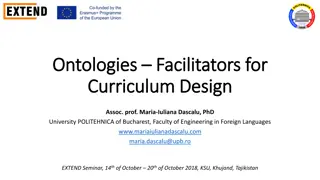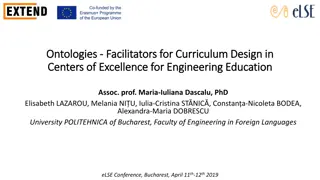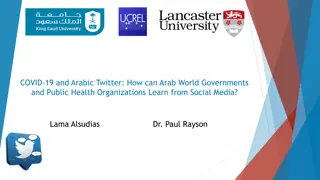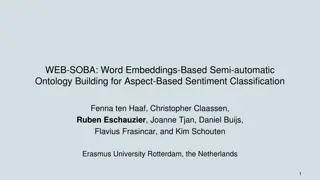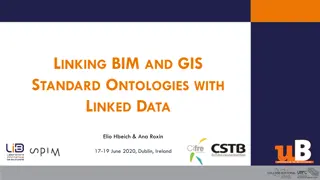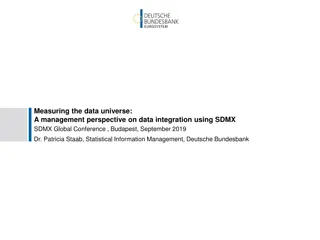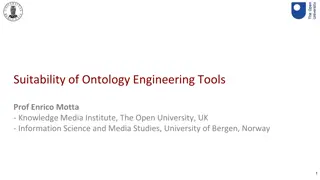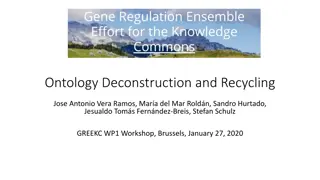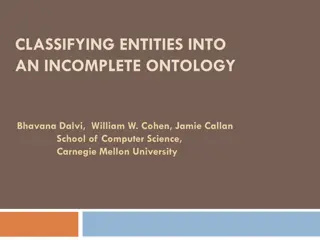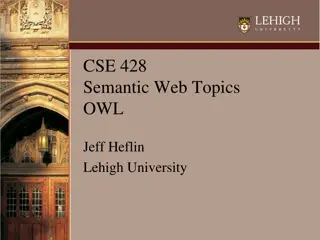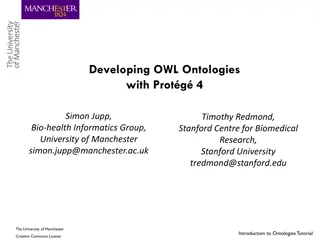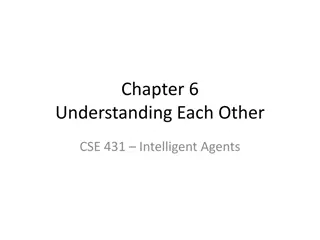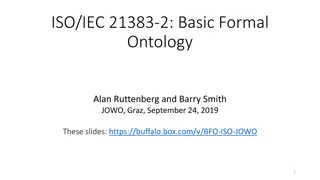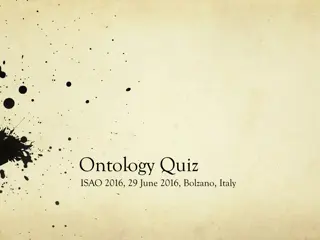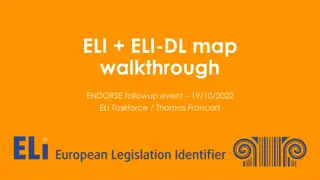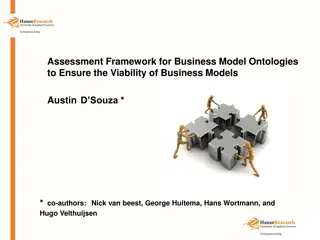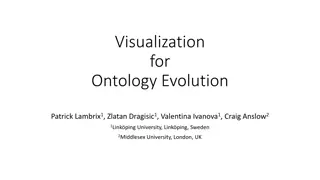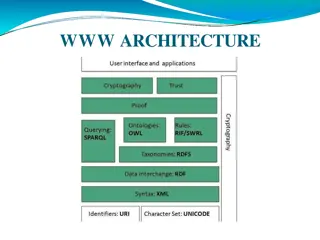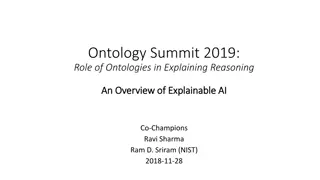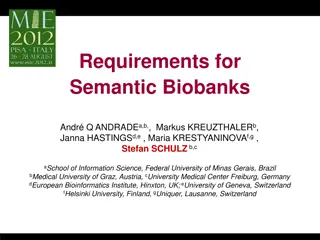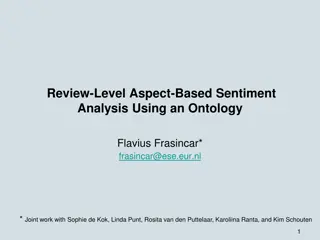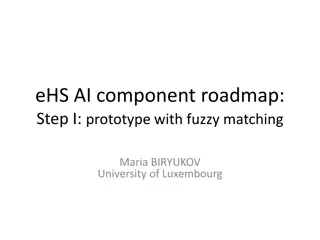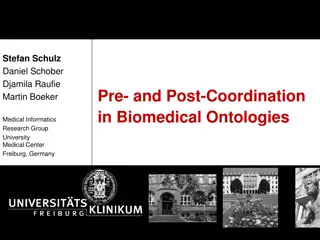Ontologies in Curriculum Design and Computer Science
Explore the role of ontologies in curriculum design and computer science, delving into their origins, components, and structures. Discover how ontologies facilitate shared conceptualizations and formal specifications in various domains.
0 views • 19 slides
Leveraging Ontologies for Modern Curriculum Design in Engineering Education
Developing a contemporary academic curriculum requires adherence to industry demands, connectivity to global programs, and incorporation of technological tools like ontologies. Discover how ontologies facilitate curriculum design and the transition from conventional to modern approaches, highlightin
0 views • 20 slides
Leveraging Arabic Twitter for COVID-19 Insights
Governments and Public Health Organizations can harness the power of Arabic Twitter to extract valuable insights during the COVID-19 pandemic. By analyzing Arabic tweets, they can uncover topics of discussion, identify rumors, predict tweet sources, and update disease ontologies. Data collection spa
0 views • 20 slides
WEB-SOBA: Ontology Building for Aspect-Based Sentiment Classification
This study introduces WEB-SOBA, a method for semi-automatically building ontologies using word embeddings for aspect-based sentiment analysis. With the growing importance of online reviews, the focus is on sentiment mining to extract insights from consumer feedback. The motivation behind the researc
2 views • 35 slides
Term Overlap Among Matportal Ontologies
The study focuses on term overlap among 5 Matportal ontologies, assessing interoperability and semantic ambiguity. Results show high rates of URI matches between specific ontologies, with discussions on the implications and potential solutions for enhancing interoperability.
0 views • 7 slides
Linking BIM and GIS Standard Ontologies with Linked Data
Introduction to the need for seamless data interpretation between Building Information Model (BIM) and Geographic Information System (GIS), focusing on aligning BIM and GIS standard ontologies for semantic interoperability. Addressing the challenges of data interoperability layers and the characteri
0 views • 15 slides
Managing Data Integration: A Management Perspective
The data universe is expanding rapidly, leading to challenges in organizing and extracting valuable information. Dr. Patricia Staab discusses the importance of integrating data using SDMX at the SDMX Global Conference in Budapest. The approach involves moving towards an application-driven architectu
0 views • 12 slides
Challenges and Opportunities in Ontology Engineering Tools
Prof. Enrico Motta discusses the limitations of current ontology engineering tools, emphasizing the need for better support for creating ontological specifications. The lack of tools that offer a knowledge-level perspective and assist in sensemaking, navigation, and identifying relevant definitions
0 views • 5 slides
Ontology Deconstruction and Recycling Methodology
Development of a generic method for grooming the ecosystem of knowledge commons, addressing obsolescence, re-using content, and concentrating on popular well-maintained ontologies. The relevance for GREEKC and GRAO is explored, highlighting the importance of maintaining and updating publically avail
0 views • 17 slides
Contexts: A Meta-Ontological Approach
Ontologies provide a general representation of reality, but knowledge is mostly context-dependent. Analyzing different types of contexts, from linguistic to manufacturing, remains a challenge. This study aims to deepen the understanding of the ontological nature of contexts by leveraging a meta-onto
0 views • 14 slides
Classifying Entities into an Incomplete Ontology: Exploratory EM Approach
The research discusses methods for hierarchical classification of entities into incomplete ontologies. It explores the challenges of evolving web-scale datasets and the need for classifying entities in an incomplete ontology structure. The Hierarchical Exploratory EM model is detailed, providing ins
0 views • 27 slides
Semantic Web Modeling with OWL and Ontologies
Explore the fundamentals of Semantic Web modeling through OWL and ontologies, covering topics like property chain axioms, equality vs. inequality in URIs, sets of distinct individuals, and all values from constraints. Learn how these concepts shape the representation and relationships within linked
0 views • 15 slides
Introduction to Developing OWL Ontologies with Protégé 4
Explore the world of developing OWL ontologies with Protégé 4 through a comprehensive tutorial by Simon Jupp and Timothy Redmond from Stanford Centre for Biomedical Research and the University of Manchester. Learn about OWL introduction, Protégé 4 interface, compositional approach, and the signi
0 views • 44 slides
Understanding Intelligent Agents and Semantic Networks in Computing
Explore the world of intelligent agents, XML, RDF, OWL, ontologies, and class constructors in computing. Delve into how these technologies enable machines to understand, communicate, and process data efficiently.
0 views • 23 slides
ISO/IEC Standards and Ontologies in Information Technology
Exploring the world of ISO/IEC standards and formal ontologies as presented by Alan Ruttenberg and Barry Smith at JOWO Graz in 2019. The slides cover topics such as basic formal ontology, connectors, domain ontologies, top-level ontologies, and the requirements for being a top-level ontology. ISO/IE
0 views • 97 slides
Ontology Quiz: Test Your Knowledge on Computational Logic and Philosophy
Delve into the world of ontology with this quiz featuring questions on computational complexity, mereology, standardization of OWL, and foundational ontologies. Test your understanding on topics such as first-order predicate logic, parthood in mereology, and more. Challenge yourself and expand your
0 views • 45 slides
ELI and ELI-DL: A Comprehensive Overview
ELI and ELI-DL are frameworks formalized as ontologies for describing documents and activities, providing a descriptive but non-prescriptive approach. They utilize a model based on FRBR to categorize documents and their subdivisions, with ELI focusing on legislative acts and ELI-DL on documents duri
0 views • 29 slides
Assessing Business Model Ontologies for Sustainable Business Viability
This research delves into the assessment framework for business model ontologies to ensure the sustainability and viability of business models. It focuses on embedding decentralized energy supply within a combined energy infrastructure to create new business models. The study aims to identify the mo
0 views • 21 slides
Visualizing Ontology Evolution for Improved Knowledge Management
Ontologies are dynamic entities that evolve over time, impacting semantically-enabled applications and knowledge acquisition. This work focuses on identifying desired functionalities for ontology evolution systems, highlighting the steps involved in ontology evolution, and emphasizing the importance
0 views • 16 slides
Web Technologies: From Identifiers to FTP
Explore the world of web technologies from identifiers and character sets to data interchange frameworks and ontologies like OWL. Learn about semantic web layers, cryptography, and FTP protocol objectives. Discover how these technologies work together to create a seamless online experience.
0 views • 72 slides
Semantic Tool for Personal Information Protection
Semantic Tool for the Protection of Personal Information Act is a project led by Yahlieel Jafta, aiming to establish a knowledge base using ontology to assist individuals and organizations in interpreting the Act. The project focuses on the importance of ontologies in extending knowledge and enablin
0 views • 17 slides
Evolution of AI and the Role of Ontologies in Explainable AI
The Evolution of AI from prehistory to the modern era, exploring key milestones in the development of Artificial Intelligence. It covers the transition from early Neural Networks to the current focus on Explainable AI, highlighting DARPA's XAI program and techniques for achieving a balance between p
0 views • 7 slides
Requirements for Semantic Biobanks and Global Biobank Data Retrieval
Explore the critical aspects of semantic interoperability in biobanking, highlighting the need for formal ontologies, comprehensive annotations, and model of meaning data. The (Generalized) Biomedical Retrieval Scenario underscores the importance of effective resource retrieval based on content-base
0 views • 16 slides
Ontology-Driven Review-Level Aspect-Based Sentiment Analysis
This study presents an innovative approach to sentiment analysis at the review level, focusing on aspect-based sentiment analysis (ABSA) using ontologies. Motivated by the increasing volume of product reviews online, the research addresses the challenge of detecting sentiment associated with aspects
0 views • 30 slides
Prototyping AI Component for Fuzzy Matching in Controlled Vocabulary Terms
This roadmap outlines the development of an AI component that utilizes fuzzy matching to help users find controlled vocabulary terms. The process involves user input, AI searching, and user validation, aiming to streamline term selection and minimize manual steps. The system integrates thematic dict
0 views • 17 slides
Comprehensive Guide to Ontology Editors and IDEs for Ontologies
Explore a wide range of Ontology Editors and Integrated Development Environments (IDEs) for managing ontologies efficiently. From simple text editors to advanced IDEs like Protégé and Web Protege, learn about various tools and syntax options available. Dive into Ontology Editors like Protégé 4.3
0 views • 16 slides
Pre- and Post-Coordination in Biomedical Ontologies
The presentation discusses the principles of compositionality and the challenges of pre- and post-coordination in biomedical ontologies. It explores the benefits of using simple description logics like OWL-EL to manage terminology inconsistencies and ambiguity.
0 views • 22 slides
